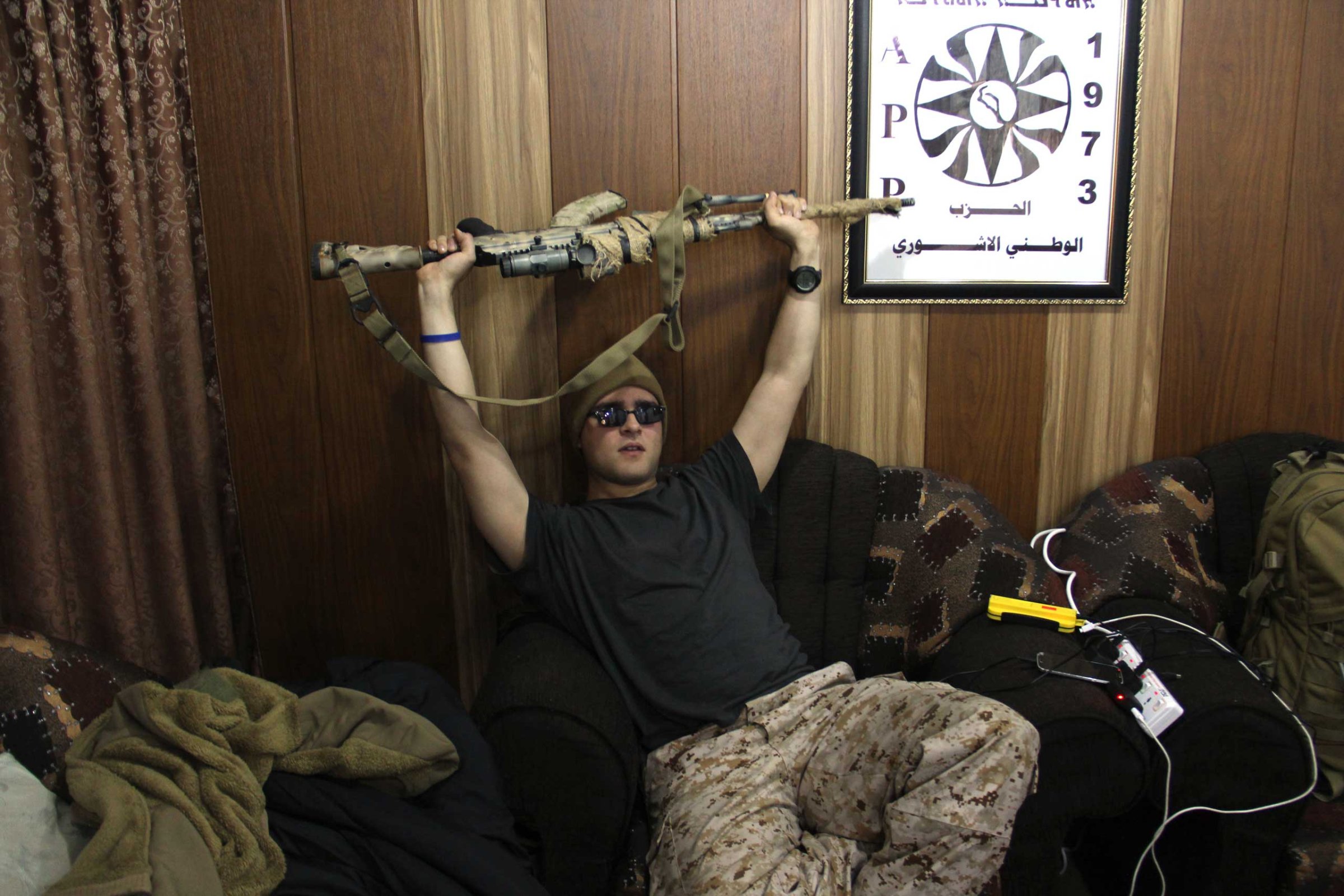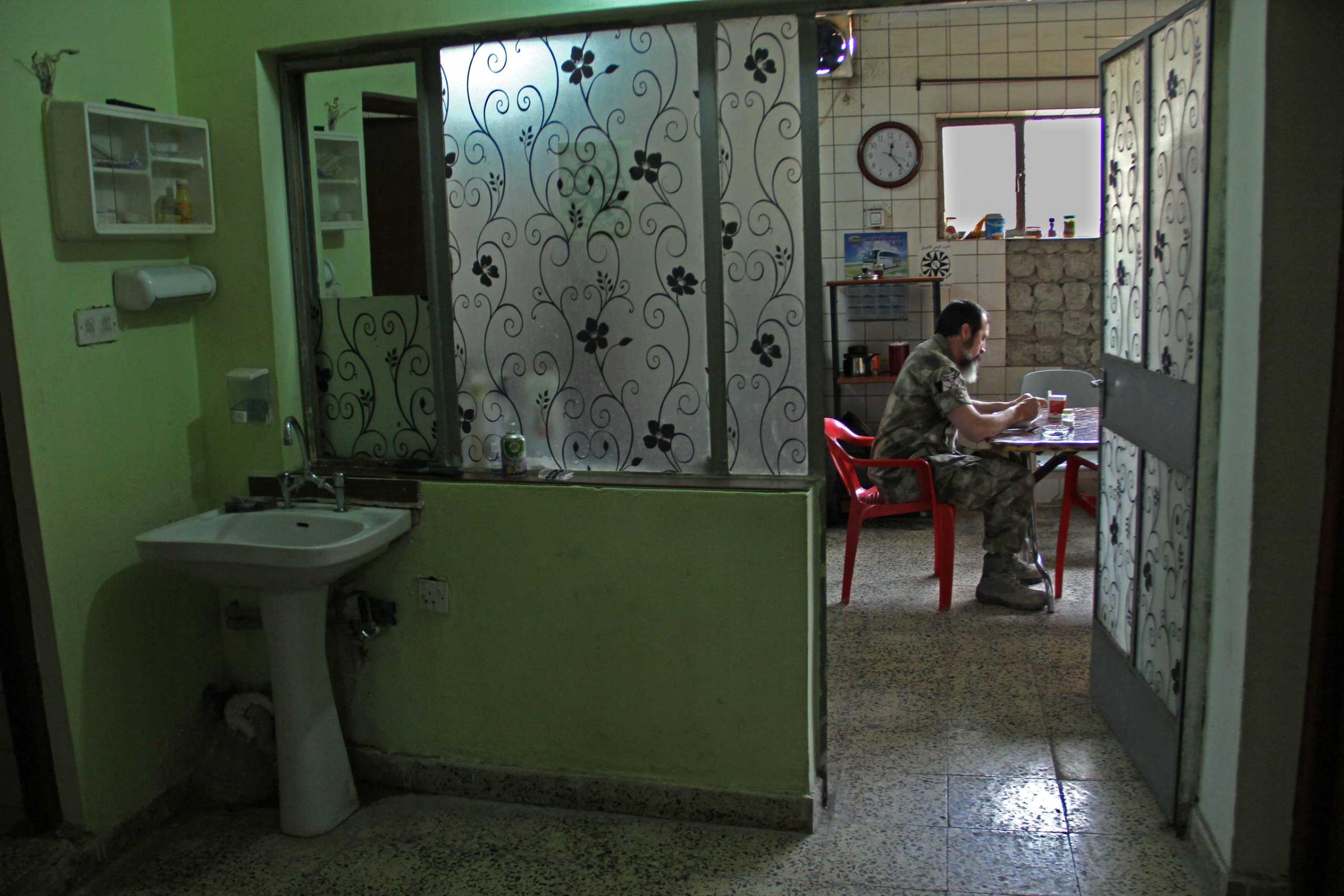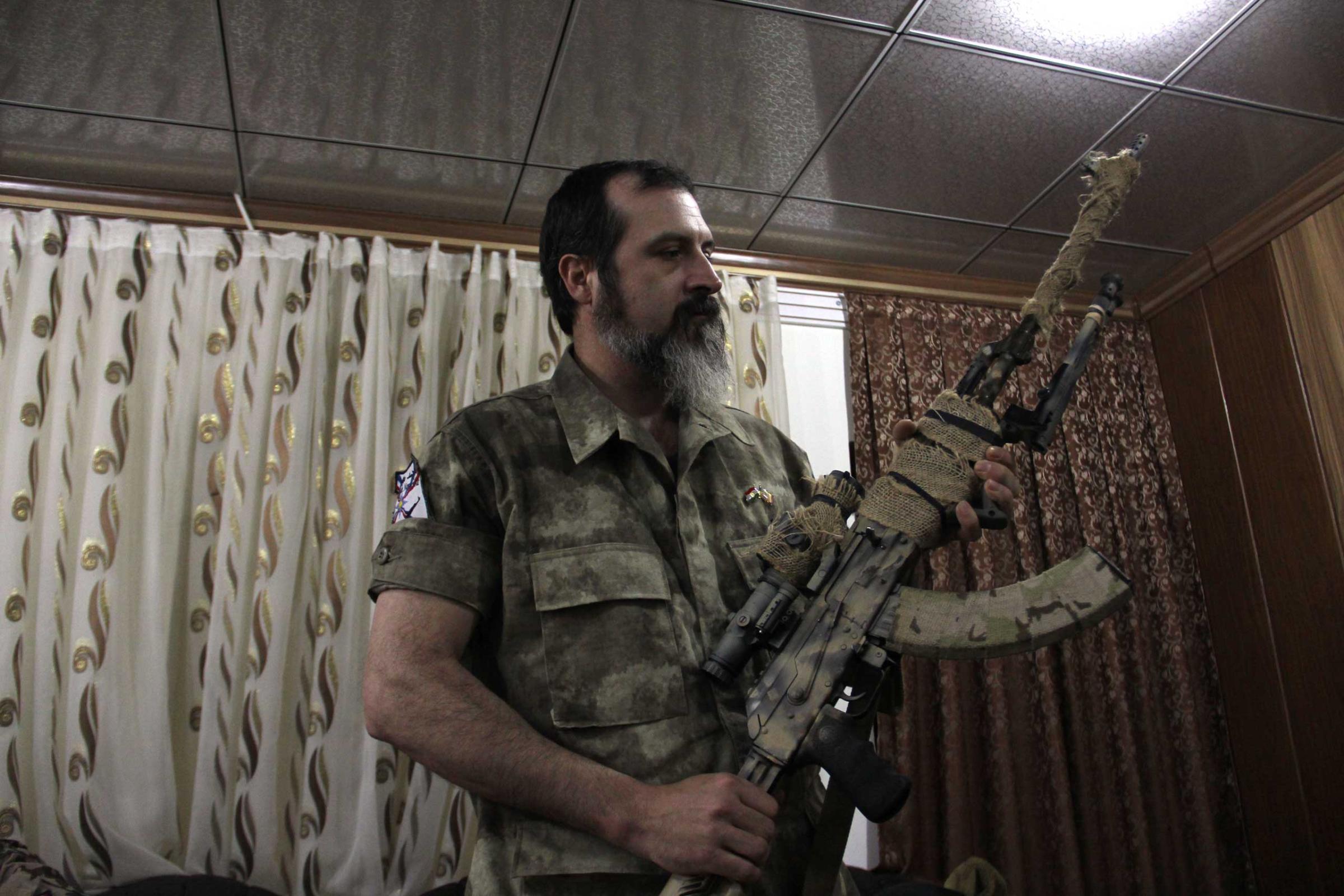
Just months after Louis finished his four-year service with the U.S. Marine Corps, he was on a plane to Iraq. He served in Afghanistan with American forces, but he spent the end of his service sitting on a base at home after the U.S. pulled its troops out of the country.
“Since Afghanistan, I kind of missed the action and everything,” says Louis, 24, who didn’t want his last name used, worrying about security. “Here they just call me Tex.”
Like most Westerners who want to come to the region to fight against the Islamic State of Iraq and Syria (ISIS), the Texas native went looking online for a militia he could join. “I used Facebook,” says Louis.
He’s now one of eight foreign recruits with Dwekh Nawsha, an Iraqi-Christian paramilitary force based in Kurdish-controlled northern Iraq.
“The Marine Corps wasn’t going to be coming out here anymore, you know, we are going into peace time,” says Louis, sitting on the couch where he now sleeps in Dwekh Nawsha’s headquarters in Dohuk, a city in northern Iraq. “In fact, I’d probably stay in the military if we were headed back here.”
So instead Louis bought his own ticket to Iraq. He spent the $3,500 he had saved while with the military on flights, ammunition and a used Kalashnikov. His weapon sits on the floor next to a jar of white nail polish he’s using to camouflage the butt of his gun. Assault rifles and military equipment are scattered around the room. A copy of American Sniper lies on the coffee table.
Louis says his Kalashnikov can’t reach ISIS positions. “The only weapon that will hit [ISIS] where they’re at….is maybe a PKC,” he says, pulling-up a photo on his phone of the Soviet-made machine gun. “I’m getting one.”
But weapons aren’t cheap and militias like Dwekh Nawsha are low on funds. Many of the foreigners volunteering here are raising money online to arm and outfit themselves and their host militias, which complain of being poorly equipped.
Louis is crowdfunding for more cash to buy the PKC machine gun, which costs about $3,000, asking for money on Facebook. “I told my donors ‘hey, we need this’,” he says. “I have friends and family who will give me money just for being out here.”
For Louis, the U.S. government isn’t doing enough to defeat ISIS, to assist these local forces and protect the civilians that have been displaced, enslaved and killed in ISIS’s onslaught. Despite months of coalition airstrikes, Iraqi and Kurdish forces have retaken only small amounts of territory back from the militants that reign over an area stretching across Syria and Iraq.
“So I’m like, I have the ability to go help these people. I might as well go do that,” says Louis. “I felt almost called to it. This is the answer to my prayers and the problems I was having.”
Louis says because he suffers from PTSD, it was unlikely he’d be deployed abroad again with the Marine Corps. This is his only option to get back into active battle.
Hundreds more foreigners have contacted Dwekh Nawsha online asking to join the militia, says Albert Kisso, a spokesman for the group. He adds that they screen the applicants.
“We take the ones that have military experience,” says Kisso.
However, many of the Americans and Europeans joining militias in Iraq and Syria have no military experience, but have been allowed to fight.
“They’re a liability,” says Allan Duncan, a veteran who first came to Iraq with the British military in 1991 and is now back on his own. “Basically we’re babysitting them.”
Duncan, who was with a Kurdish militia in Syria last year, says he’s sick of what he calls “X-Box kids” showing up in combat zones in Iraq and Syria.
“They’ve seen too many reality TV shows,” says Duncan. “They want their five minutes of fame. They want their Facebook likes. They don’t know what they’ve come into. They don’t know what war is.”
And while it’s relatively easy to join Iraqi and Syrian militias these days, the dangers are real. At least three Westerners have died while fighting with Syrian-Kurdish forces, most recently a 19-year-old German woman.
The Syrian-Kurdish forces’ struggle to defend the border town of Kobani from ISIS last year attracted international attention. The number of Westerners looking to join the fight surged.

“I thought I would come here and help the Kurds form a defensive line,” says Scott, a 44-year-old veteran from North Carolina, also declining to give his last name. Like other American volunteers, in the end Scott decided against joining the Syrian-Kurdish forces whose communist doctrine sits uncomfortably with many of the gung-ho Americans.
However, while the Christian protection mandate of Dwekh Nawsha might be more appealing, the recruits here haven’t been allowed to hold their guns on the frontline.
“There, it was sitting on my butt,” says Scott of his job as software engineer in the U.S. “Here, it’s sitting on my butt, just not quite as much.”

Instead of the battlefield, they spend most of their time in the militia’s headquarters in Dohuk, sitting around in crisp new military fatigues cleaning their weapons and posting updates for friends and family online. They take occasional field trips to the front, but Kurdish authorities have stopped them from fighting fearing they could be targets. While the militias appreciate the moral support of these foreigners, they’ve been clear what they really want is weapons and ammunition, not more fighters.
“At the minute I’m so frustrated. I’m not here to sit about. I’m here to fight [ISIS],” says Duncan, sitting on plastic chair in the kitchen of Dwekh Nawsha’s headquarters. “I’m here to fight. That’s the bottom line.”
More Must-Reads from TIME
- Cybersecurity Experts Are Sounding the Alarm on DOGE
- Meet the 2025 Women of the Year
- The Harsh Truth About Disability Inclusion
- Why Do More Young Adults Have Cancer?
- Colman Domingo Leads With Radical Love
- How to Get Better at Doing Things Alone
- Michelle Zauner Stares Down the Darkness
Contact us at letters@time.com